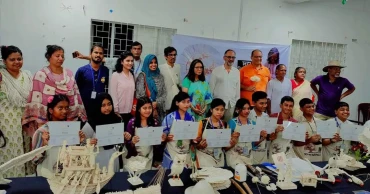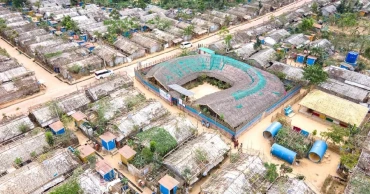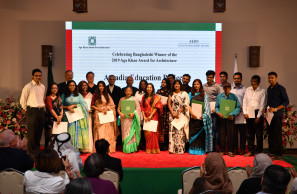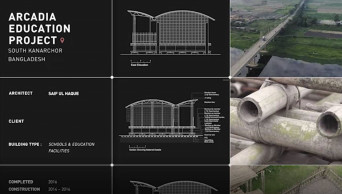Aga Khan Award
Aga Khan Award: Marina Tabassum Architects’ ‘Khudi Bari’ shines on global stage
In a moment of immense pride for Bangladesh, Marina Tabassum Architects’ groundbreaking housing solution “Khudi Bari” received the 2025 Aga Khan Award for Architecture.
Held every three years, the prize-giving ceremony for the 16th cycle of the Award took place at the Toktogul Satylganov Kyrgyz National Philharmonic in Bishkek, Kyrgyz Republic on September 15.
Bangladesh Ambassador to Uzbekistan and accredited to the Kyrgyz Republic Mohammad Monirul Islam represented the government of the People’s Republic of Bangladesh at the event.
Marina Tabassum Architects previously received the Aga Khan Award for Architecture in 2016 for the Bait-ur-Rouf Mosque, located in Dhaka.
This prestigious award recognizes the project’s innovative and sustainable approach to addressing the housing challenges of communities displaced by climate change in Bangladesh.
Prince Rahim Aga Khan V, the Steering Committee Chair of the Aga Khan Award for Architecture, said inspiring younger generations to build with environmental care, knowledge and empathy is among the greatest aims of this Award.
Marina Tabassum wins her second Aga Khan Award for Architecture with Khudi Bari
"Architecture today must engage with the climate crisis, enhance education and nourish our humanity. Through it, we plant seeds of optimism – quiet acts of resilience that grow into spaces of belonging, where the future may thrive in dignity and hope.”
The Aga Khan Award for Architecture, established in 1977 by His Late Highness Prince Karim Aga Khan IV, recognizes building concepts that successfully address the needs and aspirations of communities in which Muslims have a significant presence.
It seeks to identify and reward architectural works that not only meet people's physical, social, and economic needs but also stimulate and express their cultural and spiritual aspirations.
The Award emphasizes architecture that serves as a catalyst for pluralism, community resilience, social transformation, cultural dialogue and climate-responsive design.
The $1 million prize, shared by all the winners, is one of the largest in architecture.
Khudi Bari: A Solution Born from Bangladeshi Ingenuity Khudi Bari ("Little House" in Bengali) stood out among hundreds of nominations for its flexible, affordable, and self-build design.
Faraday future unveils two world-first products, advanced tech architecture in LA
Conceived as a solution for communities living in precarious conditions due to shifting rivers, sandbars, and the increasing threat of climate change, Khudi Bari offers a dignified and resilient housing option.
The project impressed the jury by:
● Using local materials and expertise: Khudi Bari utilizes readily available bamboo and
incorporates local construction techniques, empowering communities to build and
maintain their own homes.
● Offering a sustainable design: The homes are designed to withstand floods and are easily
dismantled and rebuilt, minimizing their environmental impact.
● Prioritizing affordability: At approximately US$450 per unit, Khudi Bari provides a
significantly more accessible housing option compared to traditional alternatives.
● Showing global application: The modular system has also been scaled up to create
women-led facilities in Rohingya refugee camps.
Other 2025 Aga Khan Award for Architecture Winners
Aside from Khudi Bari, the six other recipients of the 2025 Aga Khan Award for Architecture are:
● West Wusutu Village Community Centre (China): A community center built from
reclaimed bricks, fostering social and cultural spaces for residents and artists.
● Revitalisation of Historic Esna (Egypt): A project that addresses cultural tourism
challenges through a series of physical interventions and socioeconomic initiatives.
● Majara Residence and Community Redevelopment (Iran): Sustainable tourist
accommodations that revitalize the unique landscape of Hormuz Island.
● Jahad Metro Plaza (Iran): Transformation of a dilapidated station in Tehran into a vibrant and accessible urban space for pedestrians.
● Vision Pakistan (Pakistan): A facility in Islamabad housing a charity that empowers disadvantaged youth through vocational training.
● Wonder Cabinet (Palestine): A multipurpose, non-profit exhibition and production hub for craft, design, innovation, and learning in Bethlehem.
5 months ago
Marina Tabassum named in TIME’s list of the 100 Most Influential People for 2024
Bangladeshi architect Marina Tabassum has been named in influential US weekly TIME magazine’s list of the 100 Most Influential People in the world for 2024. Tabassum was named in the Innovators section of the list for her commitment to sustainable design that “prioritises local cultures and values, as well as the perils faced by our shared planet.”
The citation for Tabassum, written for TIME by Sarah Whiting, dean of the Harvard School for Design, says: “Tabassum’s altruism even extends to buildings themselves. She cares for her creations as creatures partaking in the resources of our earth: describing her Bait Ur Rouf Mosque in Dhaka, Bangladesh, which won the prestigious Aga Khan Award, she said a building “has to be able to breathe without artificial aids.” Elsewhere in the country, which faces increased flood risks due to climate change, she has developed houses that are cost-effective and easy to move—clearly, buildings shouldn’t just breathe; they should avoid getting their feet wet. While she practices very locally, she teaches, lectures, and is recognized internationally, modeling architecture not as an individual signature but as a collective Esperanto.”
Athens Conference: FM Hasan calls for responsible, sustainable ocean management
Tabassum's work was previously honoured with the 2016 Aga Khan Award for Architecture and with the Soane Medal by the American Academy of Arts and Letters Awards in 2021.
She was also named as the winner of the Millennium Lifetime Achievement Award at the Lisbon Architecture Triennale in 2022.
Tabassum is the principal architect of Marina Tabassum Architects, which she founded in 2005. Previously she was at URBANA, which she co-founded in 1995, shortly after graduating from BUET in 1994.
She broke into the limelight with her design for the Bait ur Rauf Mosque in Abdullahpur, that won her the Aga Khan Award, and pioneered a new generation of architects in embracing indigenous design principles for mosques, distinguished by the lack of domes, the use of plinths, the earthen palette, and the intelligent, at times bewitching use of light streaming in through perforations on the roof and walls.
Read more: 'Architecture is truly global, can also be deeply local'
1 year ago
When local communities unite to co-create a better city: Jhenaidah shows the way
People in Jhenaidah district are demonstrating the power of unity in their efforts to co-create their city.
Award-winning architect couple Khondakar Hasibul Kabir and Suhailey Farzana, who are based in Jhenaidah, are motivating local communities to get engaged. Both the current and former mayors of the district town are also supporting them.
Through consistent community participation and appropriation, extensive involvement of women, marginalised groups, and a local workforce, the seemingly simple undertaking of cleaning up the access to the Nabaganga river in Jhenaidah led to a thoughtful and minimal landscaping project with local materials and construction techniques.
Thus, came about the transformation of a derelict informal dump site into an attractive and accessible multifunctional space that is valued by Jhenaidah’s diverse communities.
The project managed to reverse the ecological degradation of the river and its banks and health hazards.
Future phases focus on public use of the river area with walkways, gardens, cultural facilities and environmental efforts to enhance biodiversity in the river.
Read: Bangladesh has a bright future if it chooses right development path: Dan Negrea
The Urban River Spaces project in Jhenaidah, created by the local architect couple was the winner of 2022 Aga Khan Award for Architecture.
“I will be helping you in your future plan for Jhenaidah. Rivers are the best resources for any city and it is a blessing for us that we have a river in the city,” said Jhenaidah Municipality Mayor Md. Quayum Shahrear Zahedee Hizawl.
2 years ago
This architect couple chose to live in Jhenaidah, designed an award-winning river space
Khondaker Hasibul Kabir and Suhailey Farzana, an architect couple from Jhenaidah in Bangladesh, have shown the world how they co-designed a public space in their own town – keeping in mind the nature and people.
Their community-led initiative titled “Urban River Spaces, Jhenaidah” is one of the winners of the 2022 Aga Khan Award for Architecture.
Six award winners, who will share the $1 million award – one of the largest in architecture – show promise for communities, innovation and attention to environment.
Read: 2 Bangladesh projects win 2022 Aga Khan Award for Architecture
The award giving ceremony will be held at Royal Opera House of Musical Arts Monday night (Muscat time).
“This is not a project, I would say, rather it’s a process that has begun,” Farzana, who came to Muscat with his husband and son, told UNB hours before receiving the prestigious award.
3 years ago
Global recognition proves Bangladeshi architecture can become an example for countries
Bangladesh can be an example for other countries if people from all disciplines, not just the architects, can put in their best efforts for the country, says a young architect.
“We got the recognition relatively in a very early stage. It proves that those in the architecture discipline are demonstrating world class examples,” architect Saad Ben Mostafa told UNB.
Mostafa is one of the three young architects whose project titled “Community Spaces in Rohingya Refugee Response, Cox’s Bazar” won the prestigious 2022 Aga Khan Award for Architecture (AKAA).
Six winners, who will share the USD 1 million award, one of the biggest in architecture, show promise for communities, innovation and care for the environment.
Read more: 2 Bangladesh projects win 2022 Aga Khan Award for Architecture
Mostafa along with his two teammates — architects Khwaja Fatmi and Rizvi Hassan — will receive the award with other winners on Monday.
The graduate from the Bangladesh University of Engineering and Technology (BUET) laid emphasis on focusing on work while understanding people’s needs and roots, not just replicating foreign designs.
“I would say, we are going to receive the award on behalf of all. I see it as a big recognition for Bangladesh,” architect Fatmi told UNB.
Architect Hassan said they wanted to see whether they can work based on local elements – taking materials and creating a beautiful, sustainable and an advanced design.
Read More: Bangladesh project among Aga Khan Award for Architecture Winners
In future, he said, they want to work in rural areas. “We want to engage people from the villages in our work. We want to see them join hands with us. We will work together.”
3 years ago
2 Bangladesh projects win 2022 Aga Khan Award for Architecture
Two Bangladesh projects are amongst six winners of the 2022 Aga Khan Award for Architecture (AKAA).
A monograph that includes essays on issues raised by the Master Jury’s selections of the shortlist and the winners for the 2022 Award will be published by Architangle in October 2022, according to a message received from Geneva.
The Urban River Spaces project in Jhenaidah created by Khondakar Hasibul Kabir and Suhailey Farzana, and the community spaces of the Rohingya Refugee Response program by architects Rizvi Hassan, Khwaja Fatmi and Saad Ben Mostafa will share the US$1 million award with four other winning projects.
Read: Bangladeshi projects shortlisted for Aga Khan Award for Architecture 2022
3 years ago
Master Jury announced for 2022 Aga Khan Award for Architecture
The Aga Khan Award for Architecture has announced the nine-member Master Jury for the 2020-22 cycle. From Bangladesh, Prof Kazi Khaleed Ashraf, Director-General of Bengal Institute for Architecture, has been named as a juror.
The nine-member Master Jury will convene in January 2022 to select a shortlist from hundreds of nominated projects. The jurors will meet for a second time in summer 2022 to examine the on-site reviews and select the final recipients of the prestigious US$ 1 million Award that's given every three years.
Read: Aga Khan Academy set to develop future leaders for Bangladesh
In fact, once the Master Jury selects a shortlist, the shortlisted projects are then subjected to rigorous on-site reviews by independent experts, most of them architects, conservation specialists, planners or structural engineers.
The selection process emphasises architecture that not only provides for people’s physical, social and economic needs, but that also stimulates and responds to their cultural aspirations.
Particular attention is given to building schemes that use local resources and appropriate technology in innovative ways and to projects likely to inspire similar efforts elsewhere.
The Aga Khan Award for Architecture is governed by a Steering Committee chaired by the Aga Khan Foundation.
The other members of the Steering Committee are Sheikha Mai Bint Mohammed Al Khalifa, President of Bahrain Authority for Culture and Antiquities, Manama; Emre Arolat, Founder, EAA-Emre Arolat Architecture, Istanbul; Meisa Batayneh, Principal Architect, Founder, Maisam Architects and Engineers, Amman; and Sir David Chipperfield, Principal, David Chipperfield Architects, London.
Read: Bangladeshi Marina Tabassum in Aga Khan Award for Architecture’s Steering Committee
The other members are Souleymane Bachir Diagne, Director, Institute of African Studies, Columbia University, New York; Nasser Rabbat, Aga Khan Professor, Massachusetts Institute of Technology, Cambridge; Marina Tabassum, Principal, Marina Tabassum Architects, Dhaka; and Sarah M Whiting, Dean, Graduate School of Design, Harvard University, Cambridge.
Farrokh Derakhshani is the Director of the Award.
4 years ago
2019 Aga Khan Award for Architecture winner honoured in city
The Aga Khan Development Network (AKDN), Aga Khan National Council, and Aga Khan Award for Architecture (AKAA) in collaboration with the Institute of Architects Bangladesh have honoured architect Saif Ul Haque – one of the winners of the 2019 Aga Khan Award for Architecture.
6 years ago
Bangladesh project among Aga Khan Award for Architecture Winners
Dhaka, Aug 29 (UNB) - A project by Bangladesh was adjudged one of the winners of the 2019 Aga Khan Award for Architecture announced on Thursday in Kazan, Russia.
6 years ago

















